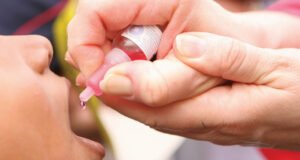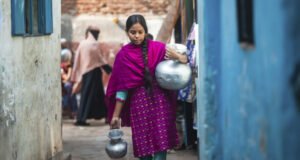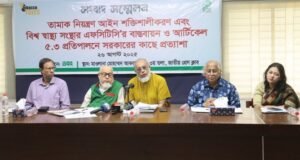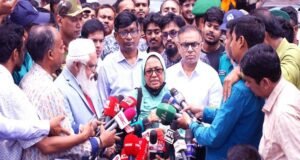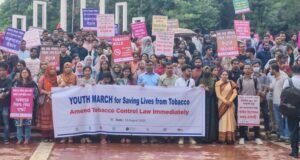
An alarming escalation in the dengue virus infection and death rates is anticipated in the wake of the Eid-ul-Azha vacation, as many city residents have left their homes vacant to visit their villages.
This has triggered concern among health experts, who believe the Aedes mosquitoes, carriers of the dengue virus, may find the empty homes conducive to laying eggs, particularly with the ongoing monsoon season.
“Something bad may happen regarding dengue transmission if the Aedes mosquito gets the chance to lay eggs and breed during the long vacation with continuous rainfall. City dwellers must ensure there is no stagnant water in their houses,” warns Prof. Dr. Nazmul Islam, Director of Disease Control at the Directorate General of Health Services (DGHS).
As of June 27, DGHS data shows that 7,754 dengue patients have been hospitalized and 47 have succumbed to the disease this year. The virus has already spread to approximately 40 districts.
In the past 24 hours, two more deaths and 145 new cases were reported. Around 80 percent of the total cases, 5,959, were in the capital. The second highest number of dengue cases, exceeding 1,000, was reported in Cox’s Bazar district, followed by Barishal.
The numbers for the first half of the year have surpassed records of the past five years. For comparison, 1,069 cases with two deaths were reported in the first six months of 2022, 372 cases with no deaths in 2021, 326 cases with no deaths in 2020, and 2,208 cases with seven deaths in 2019.
In response to the escalating crisis, Dr. Nazmul Islam stated that the health directorate has undertaken preparations, including continued training of doctors, providing pocket treatment guidelines, and establishing dengue units in hospitals.
He urged citizens to remain vigilant, emphasizing the importance of cleaning up after animal sacrifices and ensuring there is no stagnant water in homes and offices.
Prof. Dr. Kabirul Bashar, a prominent medical entomologist and scientist, pointed out a concerning behavioral change in Aedes mosquitoes, which are now breeding in dirty water as well as clean water.
“The dengue situation may take a serious turn in August and September this year. The number of infection cases may also increase after the holidays as mosquitoes can breed during the vacation,” he said.
He warned that the dengue virus might spread nationwide within a month and stressed the importance of eradicating the Aedes mosquito to keep the situation under control.
Talking to the Daily Sun, Dr. Md Ekramul Haque, Deputy Program Manager at the DGHS, revealed that in the ongoing pre-monsoon Aedes survey which started from June 17, larvae of the Aedes mosquito were found in 16 percent of the houses in both Dhaka North City Corporation (DNCC) and Dhaka South City Corporation (DSCC).
In a bid to curb the spread of dengue, sources within the Local Government, Rural Development and Co-operatives (LGRD) Ministry disclosed that the government has devised a long-term strategy, which includes conducting regular anti-mosquito drives in local government units, encompassing metropolitan cities.
Brig. Gen. A.K.M Shafiqur Rahman, Chief Health Officer of DNCC, stated that the city corporation will be actively conducting anti-mosquito drives during the Eid holidays, excluding the day of Eid, in order to exterminate the mosquitoes.
Dr. Fazle Shamsul Kabir, Acting Chief Health Officer of the DSCC, described various measures put in place to tackle the dengue situation. According to him, ten special teams will operate during the Eid vacation to obliterate the breeding grounds of the Aedes mosquito.
The World Health Organization (WHO) defines dengue as a viral infection propagated to humans through the bites of Aedes mosquitoes infected with the dengue virus. While the majority of dengue virus (DENV) infections are asymptomatic or result in mild illness, severe cases and fatalities can occur.
The WHO emphasizes that “Prevention and control of dengue depend on vector control. There is no specific treatment for dengue/severe dengue, and early detection and access to proper medical care greatly lower fatality rates of severe dengue.”
Most individuals afflicted with dengue experience mild symptoms or none at all and typically recover within 1-2 weeks. However, in rare instances, the infection can be severe and fatal. When symptoms manifest, they usually occur 4-10 days post-infection and last for 2-7 days.
The primary vector for the transmission of the virus to humans is the Aedes aegypti mosquito. However, other species within the Aedes genus can also serve as vectors, though their contribution is considered secondary to that of Aedes aegypti.
 Weekly Bangla Mirror | Bangla Mirror, Bangladeshi news in UK, bangla mirror news
Weekly Bangla Mirror | Bangla Mirror, Bangladeshi news in UK, bangla mirror news


